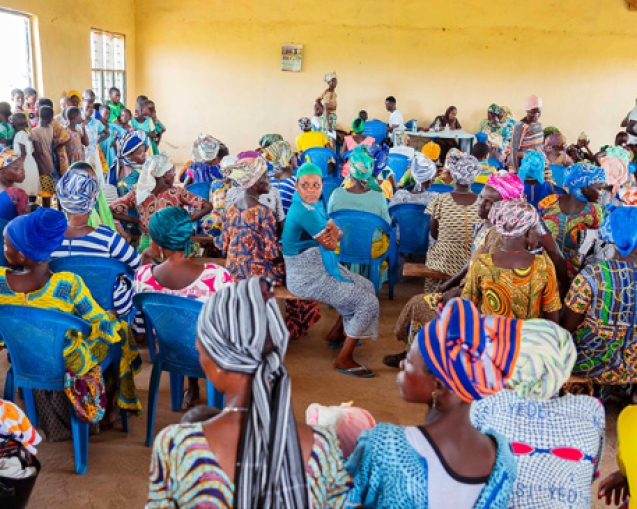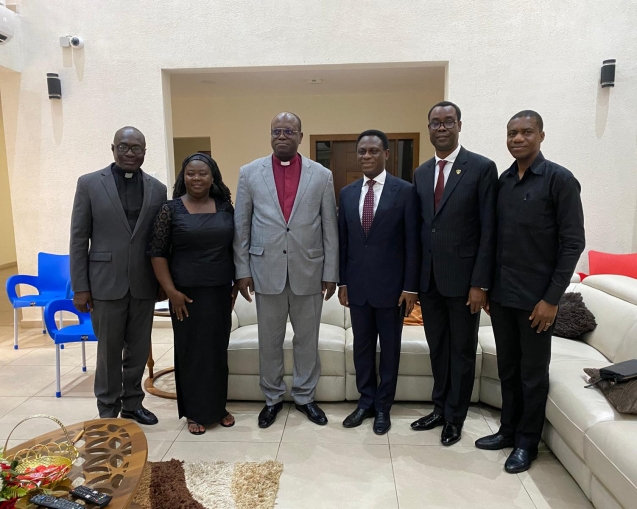“And rising very early in the morning, while it was still dark, he departed and went out to a desolate place, and there he prayed”. (Mark 1:35, ESV).
And he came out and went, as was his custom, to the Mount of Olives, and the disciples followed him. And when he came to the place, he said to them, “Pray that you may not enter into temptation.” And he withdrew from them about a stone’s throw, and knelt down and prayed (Luke 22:39-40, ESV).
“And they continued steadfastly in the apostles’ doctrine and fellowship, and in breaking of bread, and in prayers.” Acts 2:42 KJV.
And he rose and went. And there was an Ethiopian, a eunuch, a court official of Candace, queen of the Ethiopians, who was in charge of all her treasure. He had come to Jerusalem to worship and was returning, seated in his chariot, and he was reading the prophet Isaiah. And the Spirit said to Philip, “Go over and join this chariot.” So Philip ran to him and heard him reading Isaiah the prophet and asked, “Do you understand what you are reading?” And he said, “How can I, unless someone guides me?” And he invited Philip to come up and sit with him. (Acts 8:27-31, ESV).
1. INTRODUCTION
The Church of Pentecost (CoP) under Vision 2023 has been working under the theme: Possessing the Nations, which aims at influencing every sphere of society with Kingdom values and principles. Within the Vision 2013, the local church is seen as the focal point for most activities of the Church. Commitments were made to position the local church as an equipping centre to orient and equip the members. It was also expected that the members of the local church as light and salt, and acting like yeast, would be actively involved in ensuring community transformation.
In view of these commitments, the following were projected as some of the activities to be undertaken for making an impact in the nations:
- Intensification of Holy Spirit baptism and infilling in all local assemblies worldwide.
- Positioning the local church as a house of prayer and a place of sound biblical teaching.
- Ensuring that local assemblies have prayer days for intensive prayers.
Being in the fifth year of implementing the vision, it is expedient that leadership is considering reviewing and strengthening the activities of the local church as its strategy to make the maximum impact in the nations. This is to be done in the form of a tactical withdrawal (retreat) and repositioning itself to make maximum impact. Much cannot be done without giving attention to the individual church member to ensure his or her spirituality.
In the command of the Great Commission, Jesus placed emphasis on the continual transformation of all new followers who come to Him. New followers of Christ immediately began learning all of Jesus’ teaching through the Apostles and other church leaders (Ac. 2:42). Over time, as the teachings of Jesus began to transform the daily countenance of new believers, they themselves would begin sharing their faith in Jesus to their community, thus, starting the entire discipleship process of Matthew 28:18-20 over again. This, I believe is what the Possessing the Nations agenda is all about.
Tidwell and Kim (2020, 106) in their editorial work, ‘The Educational Ministry of a Church’ advance that, “the pursuit of learning the teachings of Jesus within the local church has its foundation in the Bible”. They continue to assert that no class or group that “seek to grow in Christ” should go on without the Bible. While acknowledging how modern technology and supplemental literature pieces are contributing to help the church in this area, Tidwell and Kim pose the question: “what happens when regular attenders and members leave the preaching environment”? They answered, “Sunday school and small groups have emerged as the preeminent environments where teaching and learning combine to create spiritual transformation in the hearts of students”.
This paper will firstly consider the need to promote personal devotion in the lives of the members with the belief that it takes strong individuals to build a strong church. Consideration will then be given to encouraging prayer in small groups not only as a way of fellowship, but with the biblical basis that Christ promises to be where two or three are gathered in His name (Mat. 18:20).
- UNDERSTANDING PERSONAL DEVOTION
The need to develop personal devotion should come from the knowledge that the local church consists of individuals who must come together with each looking to Jesus as the author and finisher of our faith. A. W. Tozer (1948), in his book “The Pursuit of God” puts it this way:
Has it ever occurred to you that one hundred pianos all tuned to the same fork are automatically tuned to each other? They are of one accord by being tuned, not to each other, but to another standard to which each one must individually bow. So, one hundred worshipers met together, each one looking away to Christ, are in heart nearer to each other than they could possibly be, were they to become ‘unity’ conscious and turn their eyes away from God to strive for closer fellowship.
It is with this understanding that it becomes vital that each person develop their spirituality by personal devotion to God. Without each person making time to pursue God in their own lives, there is no church.
Merriam-Webster Dictionary defines devotion as an act of prayer or private worship and particularly in our context, as “a religious exercise or practice other than the regular corporate worship of a congregation.” This is a discipline one undertakes, or commits to, in order to continually know the Lord and be built up in Him. It employs different practices or activities tied to the word of God. Devotion carries with it the idea of loyalty and love or care for someone or something.
The time of personal devotion is also commonly called “Quiet Time” because of it being a period of quietly waiting upon God after a time of prayer. In it is the desire or a longing for God. David, the king of Israel states, “O God, you are my God; early will I seek you; my soul thirsts for you in a dry and thirsty land where there is no water” (Ps. 63:1-2) NKJV.
He further adds in Psalms 5:3 (NKJV): “My voice you shall hear in the morning, O Lord; in the morning I will direct it to you, and I will look up.” The Lord Jesus Christ also had a habit of waking up early in the morning to wait upon the Father (Mk. 1:35, Mat. 14:23; Mk. 6:46).
In the Old Testament, we may infer some individuals who were distinct in observing the routine of personal devotions. Job and Daniel probably had this discipline. Job’s practice of personal devotion is noted as his “regular custom” (Job 1:5). As a custom, personal devotions, notably, may be a practice that is repeatedly done and has become part of one’s behaviour by which he or she can be identified with. It is not an occasional or seasonal exercise to appease an authority or satisfy a religious provision per se. Rather, it should be a personal resolve and obligation to respond to God in worship from one’s conviction and understanding.
It is in this same manner that Daniel was known in the kingdom of Babylon as an official in government and a Jew. Though some of the Jews in captivity might have compromised and sacrificed their spiritual identity, Daniel “resolved not to defile himself with the royal food and wine” (Dan. 1:8). Hence, he defied all the threats and decree of the royal authority and continued in the discipline “he got down on his knees and prayed, giving thanks to his God, just as he had done before” (Dan. 6:10b, NIV). Daniel’s case brings up what activities could be entailed in personal devotion, and that it is to be done continually and the difficulties to continue faithfully in keeping to this discipline. Identifiably, Daniel shows that: fasting, praying, solitude are some activities that mark personal devotions. However, the world system and its demands can be a setback to the pursuit. Daniel’s work mates in government were against him and his God.
Jesus as a sign of devotion to the Father, often went out very early in the morning, while still dark to pray and wait on Him. He observed solitude and would withdraw from the crowd for a moment to pray (Mk. 6:45-46). The Scriptures reveal that it was his habit to revert to the Mount of Olives (Lk. 22:39).
Another case is that of the Ethiopian eunuch (Ac. 8:26-40) on his way to worship in Jerusalem, who we can infer to be doing his ‘personal devotion’. He was reading aloud the book of Isaiah. The Holy Spirit working through Philip helped him to understand what he was reading and was saved thereby. Interestingly, depending on the circumstance, one can have their personal devotion while seated in their ‘chariot’ or on the ‘desert road’. Very instructive of the instance of the Ethiopian eunuch is the reading aloud of the Scriptures which could connote scriptural memorisation which is an integral component in the practice of personal devotions. This was a functional part in the training obtained from our days of Scripture Union (SU) in the secondary schools of Ghana.
- Benefits of Personal Devotion
From the above, personal devotion is a regular appointment that we keep with God to commune with Him. Communication is essential in every valued relationship. It helps the growth and development of the relationship, so we need to talk to and listen to God in our love relationship with Him. During this important period, we shut out any distractions and focus on our Lord Jesus Christ out of love and loyalty. It is about creating a life full of devotion, and the way we do that is by setting aside a regular time for prayer and Bible reading. When we set time aside to truly connect with our creator, we are collaborating with Him to see that spiritual growth and transformation is happening in our lives.
The need to stay connected with the Lord for the believer to be refreshed and be fruitful is driven home by Jesus:
I am the true vine, and my Father is the gardener. He cuts off every branch in me that bears no fruit, while every branch that does bear fruit, he prunes so that it will be even more fruitful. You are already clean because of the word I have spoken to you. Remain in me, as I also remain in you. No branch can bear fruit by itself; it must remain in the vine. Neither can you bear fruit unless you remain in me.” Jn. 15:1-4 (NIV).
- From the above Scripture, personal devotion helps the believer to grow in our knowledge and understanding of the Lord and His Word, helping us to have a deeper relationship with Christ. This brings personal transformation, and the believer becomes more fruitful.
- Making time to regularly fellowship and commune with the Lord helps deepen our living relationship with Him. The more we do this, the more we see our need for Him.
- Waiting on Him quenches the thirsting of one’s soul (Ps. 42:1-2).
- Grants strength to the weary (Is. 40:31).
- It helps us to build a life of self-discipline. Making a habit of setting a specific time and keeping to it helps the believer to train themselves in self-control and discipline (Tit. 1:8).
- Personal devotion helps us to be mindful of God’s presence. The pressure of time can make the Christian develop a tendency of going through the day losing sight of God’s presence as being right beside us in every moment. Patrick Morley, a Christian author is quoted as saying, “whenever a man tells me that he doesn’t feel very close to God, the first question I ask is, ‘Tell me about your devotional life.’” He often identifies that as the basic problem.
- It enables one to become more like the Master that we behold in our time of devotion. In Exodus 34:29, Aaron and the other leaders noted something about Moses after he had spent time alone with God. His face was radiating with the glory of God. Just as the smoke in an environment smell on us when we expose ourselves to it for a period, the beauty and fragrance of the Lord rubs off us as we keep ourselves locked in on Him and gazing into His face.
- Activities undertaken during the Period of Personal Devotion or Quiet Time
As mentioned earlier, but for emphasis, two activities are essential to have an effective time alone with God. These are prayer and the word.
- Prayer: We must have time to speak to God and allow Him to speak to us. Prayer should not be a monologue, but a two-way street where we are available to listen to the Master speak to us. That period of being silent before Him gives credence to the term “quiet time.”
- Reading and studying the Word of God: God speaks to us during the reading of His Word. He gives us guidance as we search the Scriptures. (Ps. 119:9; 105). We are assured of being prosperous and successful as we meditate on the Scriptures (Jos. 1:8).
Types of study
There are various ways to read and study the Bible. In brief, some of these are:
- Topical Study – One chooses a topic, e.g., Love and find Bible references that addresses the topic.
- Character Study – This is the study of a Biblical character or about a place in the Bible. It helps you to explore the heart, attitude, and personality of a particular person in the bible. Also, a place severally mentioned in the Scriptures such as Hebron could be studied starting from Genesis 13-18; Genesis 23, etc.
- Chronologically – This involves studying through the Bible in the order in which events occurred. It helps the student to gain new insights and rightly connect between passages and books that could otherwise be overlooked. Online resources such as The One Year Bible Online and IntoThyWord.org. can help with the study.
- Book Study – This helps the student delve into the context in which the Book was written. It involves going through the Book verse-by-verse or paragraph-by-paragraph. Book Study could be inductive or deductive. Inductive study involves observation (what does it say), interpretative (what does it mean), and application (what does it mean for my life?).
Deductive study is the process of discovering the original and intended meaning of the Scriptures.
- Word Study – During the study of a Book, one may come across a Word that he or she needs clarity of insight. You must consider where the word is used in the Scriptures and how it is used. Using Bible Aids like a Concordance, one may look at the root of the word in Hebrew for the Old Testament, or Greek in the New Testament, and how the word is variously interpreted in the Scriptures.
- Guide to Develop a Consistent Devotional Life
- Must Seek the right environment: We must remember that it is a period of personally meeting with God. Hence, a place devoid of disturbances and distractions is particularly important (Mat. 6:6). Jesus would choose a secluded or desolate place (Mk. 1:35, Mat. 14:23, Lk. 5:16).
- Choose the Right Time: We need to prioritise our time with God, especially in these times with so many things competing for our attention. We ought to build it into our day. A discipline we picked from Scripture Union was “No Bible, No Breakfast.”
Some people try to find any available time during the day, but it is highly recommended that it be consistent and the first activity of the day. The Master deserves our best time. Personally, the mantra for me has been “Speak to God before speaking to anyone else”.
With these two in place, we undertake personal devotions with some requisite materials; a version of the Bible, which is easy to read and understand, and a writing gadget/pad to note or record what the Lord reveals in such moments. If it is for an extended period of “waiting”, other Christian literature or pre-recorded sermons are helpful.
- Encouraging Personal Devotion in the Church
- Alone with God – the session where during programmes we afford people to privately focus on the Lord may be re-introduced or emphasised. Residential retreat-based programmes like conventions and camps must aim to inculcate this discipline, and participants given the opportunity to share what they heard from the Lord.
- Use of a Devotional Booklet such as Stream of Living Waters. To ensure the effective use of the church’s devotional book produced annually by the Youth Ministry, the ministry or the NDLDC (in monitoring the annual Bible Reading Plan), can facilitate a training seminar on its use for effective personal devotions and small group Bible Studies.
- Ministry leaders can help sensitise the practice of personal devotions, as well as ministers modelling it to their presbyteries, and Area Heads to their ministers.
3. SMALL GROUP PRAYER MEETINGS
Rick Howerton in an article “Defining Small Groups” defines a small group as “A micro-community of three (3) to 12 Jesus followers doing the Christian life deeply together.” He further states that if honesty and vulnerability are necessary for spiritual growth, group dynamics would tell us that the levels of transparency that make this possible won’t happen if the group is made up of more than 12 or less than three (3) individuals.
Jesus gives several examples in His ministry as to the importance of small groups. He had a small group at the beginning of His ministry (Mt. 4:18-22) to enable Him minister within a framework of interpersonal relationship. From the many followers, He chose 12 that they may be with Him and designated them apostles (Lk. 6:13). This small group formed the basis or platform for His ministry to large groups. Often, they were with Him as He preached to large groups (Mk. 3:7). As His time of crucifixion drew near, He seems to spend more time with the twelve and less time with the multitude (Mt. 16ff.; Lk, 17, 18).
Paul also seems to have a small group of people who could be his team members. People like Barnabas, John Mark, Silas, Luke, and Timothy accompanied him on his journeys and could be partners in prayer.
The use of small groups in Christian-education ministries is becoming increasingly popular among churches across the globe. In the past forty years, through the influence of Carl George, Roberta Hestenes, Lyman Coleman, and Yonggi Cho, many small-group practitioners advocate small groups as one of the most authentic expressions of the church since Acts 2:46-47. Gareth Icenogle (1994, 13) writes:
The small group is a generic form of human community that is transcultural, transgenerational, and even transcendent. The call to human gathering in groups is a God-created (ontological) and God-directed (teleological) ministry, birthed out of the very nature and purpose of God’s being. God as Being exists in community.… The natural and simple demonstration of God’s communal image for humanity is the gathering of a small group.
For the early church, it was in homes that the church shared meals, prayed for each other, studied the most recent letters from Paul, other apostles, grieved the loss of loved ones, celebrated new converts, and grew in the Lord. The early church experienced life through small circles of community we now call small groups. Tidwell and Kim state that the decision to employ small groups as the primary method of discipleship is not one of convenience, but of theology.
In John 17:20-23, Jesus prays that the followers would be ushered into fellowship with the Trinity, and thus, “the world will know you belong to me if you love one another” (John 13:35). The actual caring, loving, admonishing, sharing, serving, supporting, and celebrating of one another in community testifies to Jesus’ love. Furthermore, in Exodus 18:13-27, Moses’ father-in-law, Jethro, observed Moses struggling to care for the needs of Israel. Jethro counselled Moses to select judges who could overseer groups of people and would settle disputes within those groups. Ultimately, this helped Moses to implement a plan of care to meet the needs of the congregation. Small groups thus ensure the needs of group members are met.
One of the trademarks of the Church of Pentecost is its dedication to prayer. The mantra: Prayer is the work, and the work is prayer has been carried down from the Founder, Rev. James McKeown to the current generation.
A typical CoP assembly had its doors open for any member to walk in and spend time before the Lord. There was always a call for prayer after every message and the members prayed the reality of the message into their lives.
Members were known to meet in small groups to pray for the church, especially for impending programmes, and to pray for their individual needs. Friends would take new members out and pray with them till they received the baptism in the Holy spirit. It will therefore be expedient to reflect on this fading core value and find appropriate ways to revamp it in an effort to strengthen the local assembly.
3.1 Importance of Prayer
Jesus captures the importance of prayer as he modelled it to His disciples. This motivated one of them to ask him to teach them to pray (Lk. 11:1). Before he went to the cross, He also asked them to pray in order not to fall into temptation (Mt. 26:40-41; Mk. 14:38; Lk. 21:36).
John Wesley also postulates that, “it seems God is limited by our prayer life – that He can do nothing for humanity unless someone asks Him”. I believe it is because He has given humanity dominion over the earth. This is well demonstrated in the life of Elijah as captured in James 5:16-18 NIV, “The prayer of a righteous man is powerful and effective. Elijah was a man just like us. He prayed earnestly that it would not rain, and it did not rain on the land for three and a half years. Again, he prayed, and the heavens gave rain, and the earth produced its crops.”
Matte Gregg in the book “Unstoppable Gospel” indicates that it is only through prayer that God changes hearts and circumstances. The New Testament bears witness to this assertion. After 10 days of prayer which resulted in them being baptised in the Holy Spirit, Acts chapter two reveals how the fearful bunch of the early disciples gathered in the Upper Room, came out in boldness to bear witness to the resurrection of Jesus. This resulted in three thousand people being saved and added to the nascent church.
The place of prayer could not be lost on Pastor McKeown. He asserted that if the church he was leading was to become great, it would be through prayer, and therefore taught them of the benefits of being one with God through prayer (Leonard, 1989). He is quoted as having said “At the commencement of the work, 40 years ago, there was prayer and yet more prayer. If we follow education, we will get what education gives. If we follow material things, we will get what they give. We have to seek the Lord and wait on Him – this is the secret of the church’s success and expansion.” (Leornard, 1989, 45-46).
Unfortunately, Ravenhill (1986) indicates that the place of prayer is the most deprived areas of the church. He makes the profound statement: “We have many organisers, but few agonisers; many players, few pray-ers; many singers, few clingers; lots of pastors, few wrestlers; many fears, few tears; much fashion, little passion; many interferers, few intercessors; many writers, but few fighters.” He intimates that if the church fails in prayer it is bound to fail in all areas.
We cannot tone down on prayer because as Matthew Henry puts it, “when God intends mercy for his people, the first thing he does is set them a-praying.” We must therefore constantly stoke the fire to get the place hot. Even as the Church has been doing well on mass prayer time, the refocusing on individual and small groups is of utmost importance.
- The Example of Jesus and Small Groups
Jesus, apart from setting time to go out to personally commune with the Father would go out with a small group of His team (Mk. 9:2).
- Example of the Early Church
After Pentecost, the nascent church met in homes for prayer and breaking of bread (Ac. 2:46). After times of suffering persecution, they went back to their company to pray (Ac. 4:23; 12:12).
- How to conduct Small Group Prayer Meetings
- Choose a suitable time, convenient for members of the group. Depending on schedule of members, a meeting lasting for an hour or more is preferable. In as much as the virtual technology is being largely employed in recent times, the group will enhance its pursuits if they intersperse their meetings with some in-person sessions.
- Choose a venue conducive for prayer such as a church hall or home of a member if the place is good enough. Personally, as a student, we used to go to the KNUST Botanical Gardens as friends to pray. Also, whilst in Zambia, we used to go up in a mountain out of town as friends to pray weekly. It is out of this that the Church of Pentecost Int., Zambia was born. It must be noted that it is helpful if the people forming the small groups, are friends. It may not necessarily have to be gender biased. They must share in the burden and be willing to pay the price. This relates to how Jesus called His disciples and would select some to pray with Him.
- Announcements and reminders ought to be sent to members so as to be punctual. This is to be done when the time is drawing nigh.
- Plan in advance for the programme for the period, stating the topics to be prayed on but leaving room for the Holy Spirit to direct as to additional topics where necessary.
- Topics to be prayed on should be relevant to the members of the group and have a clear objective. It aligns to the burden the group has signed up to offload through incessant self-sacrificing prayer. Group members must respect confidentiality (on issues prayed on, and revelations received).
- Time should be spent praying for the church, family, and friends and for the lost, that they come to Christ. Members should also pray for boldness to preach the gospel, and to capture territories and spheres of influence.
- There must be an inclusion of time to be silent and wait for the Holy Spirit to speak back to individual members. Reflections that may be helpful to the entire group can be shared on resumption.
- A caution is that care must be taken that issues shared do not become subjects of gossip in the name of prayer topics.
- Way Forward: How to Make it Effective
- The squad formation advanced lately can consider prayer as a core activity of their squad in addition to their designated ministry mandate to possessing the nations (sphere of influence).
- Family Altar that has been advocated for with the goal of enriching marriage and family life can also stress this.
4. CONCLUSION
This paper has offered the biblical basis of the discipline of personal devotions and has uncovered various activities that culminate in the practice of this discipline. It has also attempted to give the basis of forming small prayer groups in the church. The local assemblies may have to explore ways to give space during programmes for the church membership to observe these acts of loyalty to God.
REFERENCES
Gareth W. Icenogle 1994. Biblical foundations for small group ministry: An intergenerational approach. Downers Grove, IL. InterVarsity Press.
Howerton, R. (2015). Defining small groups. Lifeway, nd accessed October 18, 2022
Kim Jonathan J., Tidwell Charles A. 2020. The educational ministry of a church. A comprehensive model for students and ministers. B&H Academic Nashville, Tennessee.
Leornard, C., 1989. A Giant in Ghana. New Wine press, Chichester.
Matte, G. (2015). Unstoppable Gospel: Living out the world-changing vision of Jesus’ first followers. Baker Books, Grand Rapids.
McBride, N., How to lead small groups. straphaelcc.org accessed October 15, 2022
Ravenhill, L. 1986. Revival God’s way. A message for the church. How the church can be brought from where it is to where it ought to be. Bethany House Publishers, Minneapolis Minnesota 55438.
Howerton, R. 2014. Defining small groups. Lifeway.com accessed on October 15, 2022
Tozer A.W., 1993. The Counselor: Straight talk about the Holy Spirit. Evangel Publishers Limited. RR 1-4 Nassarawa Road, P. O. Box 3953 Kaduna, Nigeria.
https://www.merriam-webster.com/ Accessed on October 10, 2022

















